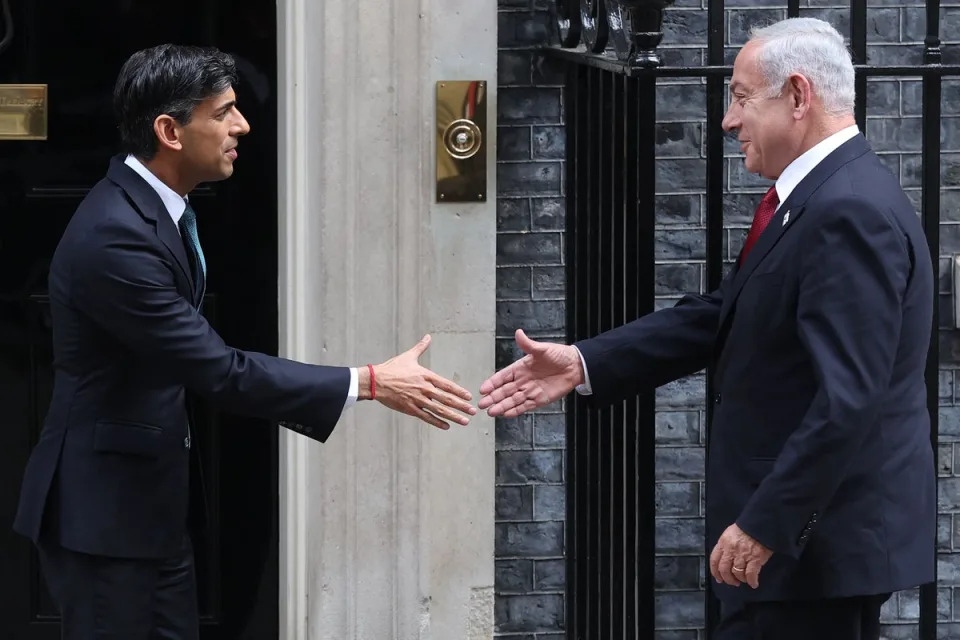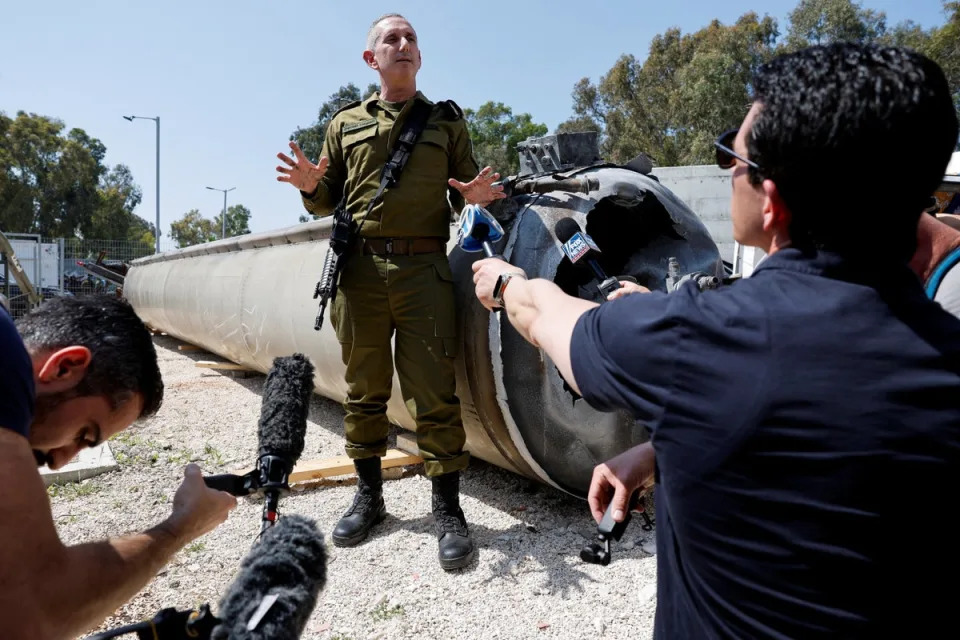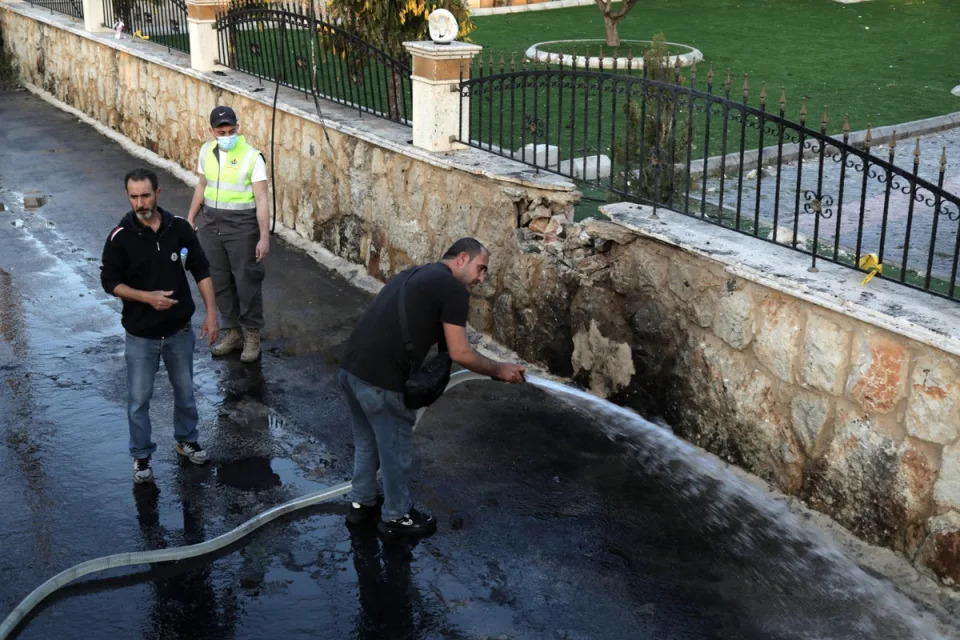Rishi Sunak has told Benjamin Netanyahu that “calm heads” must prevail over the conflict with Iran, as the United States said it will hit Tehran with more sanctions “in the coming days”.
The prime minister spoke to his Israeli counterpart, warning that “significant escalation was in no one’s interest and would only deepen insecurity in the Middle East” in the wake of Saturday’s missile and drone attack.
Israel’s war cabinet met for the third time in three days on Tuesday to decide on a response to what was Iran’s first direct attack on its territory.
Mr Sunak reiterated Britain’s “steadfast support for Israel’s security” and Mr Netanyahu “thanked the UK for its rapid and robust support,” Downing Street said.

“The prime minister said Iran had badly miscalculated and was increasingly isolated on the global stage, with the G7 coordinating a diplomatic response,” a spokesperson said about the leaders’ call.
“He stressed that significant escalation was in no one’s interest and would only deepen insecurity in the Middle East. This was a moment for calm heads to prevail.”
In Washington, treasury secretary Janet Yellen said the US was planning measures that would reduce Iran’s capacity to export oil.
“I fully expect that we will take additional sanctions action against Iran in the coming days,” she said. “Clearly, Iran is continuing to export some oil. There may be more that we could do.”
In Europe, some EU member states have asked for sanctions against Iran to be expanded in response to Tehran’s attack on Israel, foreign policy chief Josep Borrell said.

Separately, German foreign minister Annalena Baerbock said she would head to Israel within hours to discuss how to prevent an escalation.
While Saturday’s drone and missile barrage caused no deaths and little damage, thanks to Israel’s air defences and military help from allies including Britain, it has increased fears that violence rooted in the Gaza war is spreading, with the risk of open war between long-time foes Iran and Israel.
Iran called the barrage retaliation for an Israeli strike that flattened a building in its embassy compound in Damascus on 1 April and killed two of its generals and several other officers.
On Tuesday, a commander of Iran’s proxy group Hezbollah and two others were killed while travelling in car in an Israeli strike on southern Lebanon.
Ismail Baz, who was involved in planning rocket and anti-tank missile attacks on Israel, was killed near the southern town of Ain Ebel, the Israeli military said.

Hezbollah issued a statement mourning Baz’s death but did not elaborate on his role in the organisation. Hezbollah and Israel have traded fire in parallel to the Gaza war in the most serious hostilities since they fought a major war in 2006.
The fighting has claimed the lives of at least 370 Lebanese, including more than 240 Hezbollah fighters and 68 civilians, according to latest figures. Eighteen Israelis, including soldiers and civilians, have been killed.
Lebanon’s Hezbollah, along with Gaza’s Hamas and Yemen’s Houthis, form part of Iran’s “axis of resistance” – a military alliance built over four decades to oppose Israeli and American power in the Middle East, according to experts.
The axis comprises a group of proxies across Yemen, Syria, Iraq, Iran, Lebanon and Palestine, coordinated by Iran’s Quds Force, the foreign arm of the Islamic Revolutionary Guard Corps.
The Quds Force’s aim is to export Iran’s 1979 Islamic revolution abroad. The US assassinated the former head of the Quds Force, Qassem Solemaini, in January 2020.
The US also says its troops in Syria and Iraq have been attacked at least 55 times by Iran-backed proxies since Hamas’s assault on Israel on 7 October.
Israeli military pledges response to Iran attack amid calls for restraint
A view of a crater on a damaged road at a location given as Hermon area.
Israel's military chief said on Monday his country would respond to Iran's weekend missile and drone attack amid calls for restraint by allies anxious to avoid an escalation of conflict in the Middle East.
Prime Minister Benjamin Netanyahu summoned his war cabinet for the second time in less than 24 hours to weigh how to react to Iran's first-ever direct attack on Israel, a government source said.
Israel's military Chief of Staff Herzi Halevi said the country would respond, but provided no details.
"This launch of so many missiles, cruise missiles, and drones into Israeli territory will be met with a response," he said at the Nevatim Airbase in southern Israel, which sustained some damage in Saturday night's attack.
Iran's attack - launched in retaliation for a suspected Israeli airstrike on its embassy compound in Damascus on April 1 - has increased fears of open warfare between Israel and Iran and heightened concerns that violence rooted in the Gaza war is spreading further in the region.
Wary of the dangers, President Joe Biden told Netanyahu the United States will not take part in any Israeli counter-offensive against Iran, officials said on Sunday.
Since the start of the war in Gaza on Oct. 7, clashes have erupted between Israel and Iran-aligned groups in Lebanon, Syria, Yemen and Iraq. Israel said four of its soldiers were wounded hundreds of metres inside Lebanese territory overnight.
It appeared to be the first such known incident since the Gaza war erupted, although there have been months of exchanges of fire between Israel and Lebanon's armed group Hezbollah.
"We're on the edge of the cliff and we have to move away from it," Josep Borrell, the European Union's foreign affairs chief, told Spanish radio station Onda Cero. "We have to step on the brakes and reverse gear."
French President Emmanuel Macron, German Chancellor Olaf Scholz and British Foreign Secretary David Cameron made similar appeals. Washington and United Nations Secretary-General Antonio Guterres have also issued calls for restraint.
White House national security spokesman John Kirby declined on Monday to say during a briefing whether Biden urged Netanyahu in talks on Saturday night to exercise restraint in responding to the attack.
"We don't want to see a war with Iran. We don't want to see a regional conflict," said Kirby, adding that it was up to Israel to decide "whether and how they'll respond."
Countries including France, Belgium and Germany summoned the Iranian ambassadors. The French foreign ministry said France was working with its partners to de-escalate the situation.
Russia has refrained from criticising its ally Iran inpublic over the strikes but expressed concern about the risk of escalation on Monday and also called for restraint.
"Further escalation is in no one's interests," Kremlin spokesman Dmitry Peskov said.
Iran mounted its attack after the April 1 killing in Damascus of seven Iranian Revolutionary Guards officers, including two senior commanders. Israel neither confirmed nor denied carrying out the attack.
Iran's retaliatory attack, involving more than 300 missiles and drones, caused modest damage in Israel and wounded a 7-year-old girl. Most were shot down by Israel's Iron Dome defence system and with help from the U.S., Britain, France and Jordan.
In Gaza itself, where more than 33,000 Palestinians have been killed in the Israeli offensive according to Gaza health ministry figures, Iran's action has drawn applause.
Israel began its campaign against Hamas after the Palestinian militant group attacked Israel on Oct. 7, killing 1,200 people and taking 253 hostages by Israeli tallies.
G7 MULLS SANCTIONS
In Washington, Biden reiterated U.S. commitment to Israel's security ahead of a meeting with Iraqi Prime Minister Mohammed Shia al-Sudani.
Sudani, speaking alongside Biden, said their views may be divergent about what is happening in the region but they wanted to stop the conflict from expanding.
British Prime Minister Rishi Sunak said the Group of Seven major democracies were working on a package of coordinated measures against Iran.
"I spoke to my fellow G7 leaders, we are united in our condemnation of this attack," Sunak said in parliament.
Italy, which holds the rotating presidency of the G7, said it was open to new sanctions against individuals engaged against Israel.
In an interview with Reuters, Italian Foreign Minister Antonio Tajani said new sanctions would need the backing of all the G7. He suggested any new measures would be focused on individuals rather than whole nations.
"If we need to have more sanctions for people clearly engaged against Israel, supporting for example terrorism, supporting Hamas, it is possible to do it," Tajani said.
Iran's attack has caused travel disruption, with at least a dozen airlines cancelling or rerouting flights, and Europe's aviation regulator reaffirming advice to airlines to use caution in Israeli and Iranian airspace.
Iraqi Airways announced a resumption of flights between Iraq and Iran on Tuesday.
Israel remained on high alert, but authorities lifted some emergency measures that had included a ban on some school activities and caps on large gatherings.
Iranian Foreign Minister Hossein Amirabdollahian said Tehran had informed the United States that the attack on Israel would be limited and for self-defence, and that regional neighbours had been informed of the planned strikes 72 hours in advance.
Iranian Foreign Ministry spokesperson Nasser Kanaani said on Monday, however, that no pre-arranged agreement was made with any country prior to the weekend attack.
Kirby said that Iran did not warn the United States in advance of the attack's timeframe or targets, calling reports that Tehran had done so "categorically false."
Turkey's Erdogan: Israel's Netanyahu solely responsible for recent Middle East tensions
Israel's Prime Minister Benjamin Netanyahu and the Israeli leadership are solely responsible for the recent escalation of tensions in the Middle East, Turkish President Tayyip Erdogan said on Tuesday.
"Israel is trying to provoke a regional conflict, and its attack on Iran's embassy in Damascus was the last drop," he told a press conference in Ankara after a cabinet meeting.
He added that new regional conflicts were possible as long as the "cruelty and genocide" in Gaza continued, and called on all parties to act with common sense. He also slammed the West for condemning Iran's attack but not Israel's strike on Iran's embassy.
Iran attacked Israel with hundreds of explosive drones, cruise missiles and ballistic missiles launched on Saturday night, to which Israeli officials have vowed to respond.
Iran called the barrage retaliation for an Israeli strike that flattened a building in its embassy compound in Damascus on April 1 and killed two of its generals and several other officers.




